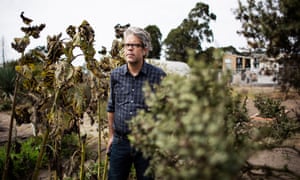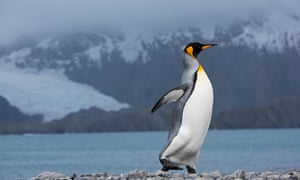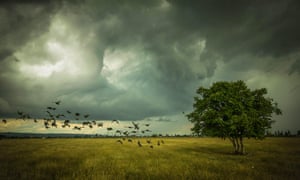A writer at the top of his game considers climate change, what we can do and what keeps him from despair
How is it possible to live with despair? If, in the wake of last month’s horrifying UN report
on global warming, you’ve been asking yourself this question, take some
solace (or at least solidarity) from the knowledge that you’re not
alone. Jonathan Franzen
has been grappling with it for years, and as the final-countdown title
of his new volume of essays suggests, his despair at the state of the
planet and our absolute inability (“political, psychological, ethical,
economic”) to save it is, if anything, deepening. “I don’t have any hope
that we can stop the change from coming,” he says bluntly at the
conclusion of his opening essay, and nothing in the following pages
suggests he is anywhere close to changing his mind.
But by refusing to hope for the impossible, Franzen, improbably, manages to produce a volume that feels, if not hopeful, then at least not hopeless. There’s nothing he can do – there’s probably nothing any of us can do – to avert or even alleviate the coming catastrophe. But for now, he’s here and he’s alive, and over the course of these essays he offers us a series of partial, tentative answers to the question he poses himself at the beginning: “How do we find meaning in our actions when the world seems to be coming to an end?”
This is not a collection that wastes time attempting to persuade us of the reality of the climate crisis; frankly, we’re way past that. “Drastic planetary overheating,” Franzen assures us, “is a done deal” – and by the way, we need to revise significantly upward our definition of what “drastic” means. The notional two-degree figure widely cited by politicians as the upper limit of what we, and the planet, could possibly accommodate is a line we’re on course to gallop past in just a few years’ time. By 2100, we may well be looking at a five or six-degree temperature rise, and even then there’s a possibility we’re being lowballed. “The scientist who confidently predicts a five-degree warming by the end of the century,” Franzen suggests, towards the end of the collection, “might tell you in private, over beers, that she really expects it to be nine.” It’s a body blow moment in a book that declines to pull its punches, and Franzen acknowledges that many of his readers – “the people for whom the prospect of a hot, calamity-filled future is unbearably sad and frightening” – might be “forgiven for not wanting to think about it”. But over the course of these essays, he succeeds in demonstrating that resignation brings with it a curious intellectual freedom. His acknowledgment that the macro problem is beyond him allows him to start thinking more creatively about micro solutions: what can be achieved here, now, today.

Jonathan Franzen in Santa Cruz, California, where he birdwatches. Photograph: Talia Herman for the Guardian
Franzen’s passion for birdwatching is almost as well known as
his novels, so to say the Audubon Society was an unlikely target is an
understatement. But it was precisely “as a bird-lover” that it attracted
his ire. In 2014, the Society had, “with much fanfare”, thrown all its
resources into the climate change fight, declaring that global warming
was “the number-one threat to the birds of North America”. There’s no
question that climate change poses an existential threat in the
medium-term, however, “in 2014, the most serious threats to American
birds were habitat loss and outdoor cats”. In Franzen’s view, the
society’s position was both “narrowly dishonest” and potentially
harmful, in that it might discourage people “from tackling solvable
environmental problems in the here and now”. He said as much in his
essay, was duly denounced as a “climate-change denier”, and retreated in
a mixture of shame and regret on the one hand, and injured
self-justification on the other. The irony, of course, was that he
wasn’t attempting to deny climate change at all: “In fact, I’m such a
climate-science accepter that I don’t even bother having hope for the
ice caps.” Rather, he was denying that our current piecemeal, unserious
attempts to mitigate it will have any consequential effect, and arguing
that therefore we might better expend our efforts on conservation
projects whose benefits “are immediate and tangible”.But by refusing to hope for the impossible, Franzen, improbably, manages to produce a volume that feels, if not hopeful, then at least not hopeless. There’s nothing he can do – there’s probably nothing any of us can do – to avert or even alleviate the coming catastrophe. But for now, he’s here and he’s alive, and over the course of these essays he offers us a series of partial, tentative answers to the question he poses himself at the beginning: “How do we find meaning in our actions when the world seems to be coming to an end?”
This is not a collection that wastes time attempting to persuade us of the reality of the climate crisis; frankly, we’re way past that. “Drastic planetary overheating,” Franzen assures us, “is a done deal” – and by the way, we need to revise significantly upward our definition of what “drastic” means. The notional two-degree figure widely cited by politicians as the upper limit of what we, and the planet, could possibly accommodate is a line we’re on course to gallop past in just a few years’ time. By 2100, we may well be looking at a five or six-degree temperature rise, and even then there’s a possibility we’re being lowballed. “The scientist who confidently predicts a five-degree warming by the end of the century,” Franzen suggests, towards the end of the collection, “might tell you in private, over beers, that she really expects it to be nine.” It’s a body blow moment in a book that declines to pull its punches, and Franzen acknowledges that many of his readers – “the people for whom the prospect of a hot, calamity-filled future is unbearably sad and frightening” – might be “forgiven for not wanting to think about it”. But over the course of these essays, he succeeds in demonstrating that resignation brings with it a curious intellectual freedom. His acknowledgment that the macro problem is beyond him allows him to start thinking more creatively about micro solutions: what can be achieved here, now, today.

Jonathan Franzen in Santa Cruz, California, where he birdwatches. Photograph: Talia Herman for the Guardian
"Where Franzen perfectly strikes the balance between form, content and voice you know you’re in the presence of a master"
It’s a complex position, both to articulate and to accept. But it is not, in the years since he first set it out, one that he has backed away from, because it represents the only hope he has left, and the central hope of this collection: that facing the future “honestly, however painful this may be, is better than denying it”. Rather, as these essays show, the conclusion he has come to is that it’s not his position that’s lacking, but his ability to put it across in a way that readers can accept. It’s a challenge to him as a writer: to think harder; to write more clearly and with more sympathy. It’s a question of what the essay, as a form and specifically in his hands, can do.

Then there’s the title essay, which comes fittingly at the collection’s close, brings together all of its strands (climate change, humanity, thinking, writing, birds), and is simply a delight. In it, Franzen weaves together, lightly but tightly, two narrative threads: his expedition on a cruise ship to Antarctica, and the life of his uncle Walt, whose unlooked-for bequest paid for the trip. The timelines diverge wildly (the trip takes a couple of weeks; Walt lived to a ripe old age) but by combining them, Franzen expertly shows how they speak to each other. They’re both stories about death: Walt, we learn, “lost his daughter” (in a car crash in her 20s), “his war buddies, his wife, and my mother” before mortality caught up with him; the Antarctic is both a death zone, the literal and metaphorical end of the world, and, thanks to climate change, dying itself. But read on, and we find that the real resonance between the two tales is the urgent case they make for the worth and beauty of life. Walt survived his tragedies, kept faith with the world, and “never stopped improvising”; in Antarctica, Franzen comes face to face with a king penguin in the wild, and finds that it “seemed to me, in itself, sufficient reason not only to have made the journey; it seemed reason enough to have been born on this planet”. It’s the work of a writer at the top of his game – limber and lovely, delivering deep insights with delicacy and grace – and it poignantly makes the only case for climate action that has any chance of succeeding: that there is so much worth living for. “Even in a world of dying,” Franzen concludes, “new loves continue to be born.”
• The End of the End of the Earth by Jonathan Franzen (4th Estate, £16.99). To order a copy for £12.99, go to guardianbookshop.com or call 0330 333 6846. Free UK p&p over £15, online orders only. Phone orders min. p&p of £1.99.

No comments:
Post a Comment